|
Books Should Be Free Loyal Books Free Public Domain Audiobooks & eBook Downloads |
|
|
Books Should Be Free Loyal Books Free Public Domain Audiobooks & eBook Downloads |
|
Adventure Books |
|---|
|
Book type:
Sort by:
View by:
|
By: A. E. W. Mason (1865-1948) | |
|---|---|
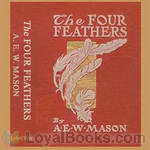 The Four Feathers
The Four Feathers
The Four Feathers is a 1902 adventure novel by British writer A.E.W. Mason that has inspired many films of the same title.The novel tells the story of British officer, Harry Feversham, who resigns his commission in the East Surrey Regiment just prior to Sir Garnet Wolseley's 1882 expedition to Egypt to suppress the rising of Urabi Pasha. He is faced with censure from three of his comrades for cowardice, signified by the delivery of three white feathers to him, from Captain Trench and Lieutenants Castleton and Willoughby, and the loss of the support of his Irish fiancée, Ethne Eustace, who presents him with the fourth feather... | |
By: Henry Oyen (1882-1921) | |
|---|---|
 The Snow-Burner
The Snow-Burner
The Snow-Burner is what the Native Americans called Reivers, and it was a rough and tumble life in the land where Reivers chose to live up to his name. The name was attributed to Reivers upon his proof after arriving in the north country because of his ability to defeat all perceived enemies in whatever means was necessary; whether by brute force and tough action, or by sheer cunning which he had gained living in the city in his earlier days. When assigned to oversee a group of foreigners in a work camp, he treated them with utter cruelty... | |
By: John Howell (1788-1863) | |
|---|---|
 The Life and Adventures of Alexander Selkirk
The Life and Adventures of Alexander Selkirk
This work was the true story of Alexander Selkirk (1676 to December 13, 1721), a Scottish sailor who was employed in a number of different trades during his early life. As a young man, Selkirk learned the skills of tanning and shoemaking, and later became a buccaneer (a government-sanctioned pirate) on the Cinque Ports, working his way up to the position of ship's sailing master or navigator. But in the case of Selkirk, his experiences would eventually help him to survive his isolation on a deserted island in the Juan Fernández archipelago, off the coast of Chile, where he spent 52 months before being rescued... | |
By: E.D.E.N. Southworth (1819-1899) | |
|---|---|
 The Missing Bride
The Missing Bride
Prepare yourself for a journey, full of adventures and plot twists which will keep you guessing until the very end. This is psychological romance at its best. In the war of 1814, an American heiress falls in love with a British officer. This ill-fated marriage brings together a large group of interesting people who would never have met in other circumstances. | |
By: H. C. Bailey (1878-1961) | |
|---|---|
 The Highwayman
The Highwayman
A romance and adventure novel, set in England during the reign of Queen Anne. The book is much unlike the author's later detective short stories. The actual book is difficult to locate and appears to have been forgotten. It is not even listed by Wiki as part of the author's work, nevermind have any information on the book itself. | |
By: Friedrich de la Motte Fouqué (1777-1843) | |
|---|---|
 Sintram and His Companions
Sintram and His Companions
Friedrich de la Motte Fouque, also the author of Undine, was a German Romantic writer whose stories were filled with knights, damsels in distress, evil enchantments, and the struggle of good against overpowering evil. 'My strength is as the strength of ten, Because my heart is pure.' Fouque blends the Romantic love for nature and ancient chivalry while telling a powerful story about a young man who yearns for that which he can never attain. | |
By: Guy Boothby (1867-1905) | |
|---|---|
 Cabinet Secret
Cabinet Secret
Witty spy adventure set during the Boer Wars of the late 19th Century. | |
By: Gertrude Atherton (1857-1948) | |
|---|---|
 Rezanov
Rezanov
This novel by the prolific Californian author Gertrude Horn Atherton is based on the real life story of Nikolai Rezanov, a man who, in 1806, pushed for the Russian colonization of Alaska and California. "Not twenty pages have you turned before you know this Rezanov, privy councilor, grand chamberlain, plenipotentiary of the Russo-American company, imperial inspector of the extreme eastern and northwestern dominions of his imperial majesty Alexander the First, emperor of Russia—all this and more, a man... | |
 Valiant Runaways
Valiant Runaways
Savage bears, a river rescue, capture by Indians, escape on wild mustangs and a revolutionary battle await the protagonists of this suspenseful adventure novel, set in California. | |
By: Roy Rockwood | |
|---|---|
 Dave Dashaway and His Hydroplane
Dave Dashaway and His Hydroplane
Never was there a more clever young aviator than Dave Dashaway. All up-to-date lads will surely wish to read about him. This second volume of the series shows how Dave continued his career as a birdman and had many adventures over the Great Lakes, and how he foiled the plans of some Canadian smugglers. (From the 1913 edition) | |
By: Apollonius Rhodius (3rd Cent. -3rd Cent.) | |
|---|---|
 Argonautica
Argonautica
The story of how Jason and a group of famous heroes of Greece took to sea in the Argos has been told many times, before and after Apollonius of Rhodes, wrote his Argonautica, in the 3rd century b.C.. It is not only the oldest full version of the tale to arrive to our days, but also the only extant example of Hellenistic epic. This was already a popular myth by the times of Apollonius, who makes the story of how Jason and the Argonauts sail to Colchis in search of the Golden Fleece, and have to go through a lot of adventures to fulfill their task, a mix of simple narrative and scholarly catalog. The Argonautica had a deep impact on European literature as a whole. | |
By: Robert Louis Stevenson and Lloyd Osbourne (1850-1894) | |
|---|---|
 The Ebb-Tide
The Ebb-Tide
Three men down on their luck in Tahiti agree to ship out on a vessel whose officers have died of smallpox. Their desperate venture inspires them to a further idea: they will steal the schooner and its cargo of champagne, sell them, and live a plentiful life. The thought is intoxicating... and so is the cargo, which they sample. Inattention nearly brings them to grief in a sudden storm. This sobering experience is followed by another - apparently the dead officers had a similar ambition! - and their dreams of riches vanish... | |
By: Robert Louis Stevenson (1850-1894) | |
|---|---|
 Wrecker
Wrecker
The Wrecker (1892) is a novel written by Robert Louis Stevenson in collaboration with his stepson Lloyd Osbourne. The story is a 'sprawling, episodic adventure story, a comedy of brash manners and something of a detective mystery'. It revolves around the abandoned wreck of the Flying Scud at Midway Island. Clues in a stamp collection are used to track down the missing crew and solve the mystery. It is only in the last chapter that different story elements become linked. | |
By: Hiram Bingham (1875-1956) | |
|---|---|
 Inca Lands
Inca Lands
Prof. Hiram Bingham of Yale Makes the Greatest Archaeological Discovery of the Age by Locating and Excavating Ruins of Machu Picchu on a Peak in the Andes of Peru.There is nothing new under the sun, they say. That is only relatively true. Just now, when we thought there was practically no portion of the earth's surface still unknown, when the discovery of a single lake or mountain, or the charting of a remote strip of coast line was enough to give a man fame as an explorer, one member of the daredevil explorers' craft has "struck it rich... | |
By: Charles Watts Whistler (1856-1913) | |
|---|---|
 Havelok the Dane: A Legend of Old Grimsby and Lincoln
Havelok the Dane: A Legend of Old Grimsby and Lincoln
Troy, Athens, Rome... each has its founding legend. So too does the Lincolnshire town of Grimsby, once the largest fishing port in the world. Havelok the Dane probably derives from a folk-tale, orally passed down before assuming written form - first in Anglo-Norman French, later in Middle English verse (c. 1280-1300). It tells of the rescue of the Danish prince from a wicked regent, who has tried to procure Havelok's murder. Grim the fisher, the appointed hit-man, thwarts the plan by spiriting the lad to England, where Grim settles with his family on the coast, adopting Havelok as his foster-son and naming the new community after himself... | |
By: Henry Gilbert (1868-1937) | |
|---|---|
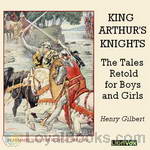 King Arthur's Knights: The Tales Retold for Boys & Girls
King Arthur's Knights: The Tales Retold for Boys & Girls
This book is an attempt to tell some of the stories of King Arthur and his Knights in a way which will be interesting to every boy and girl who loves adventures. (Introduction by Henry Gilbert) | |
By: Charles W. Diffin (1884-1966) | |
|---|---|
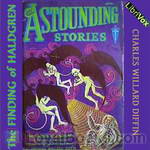 The Finding of Haldgren
The Finding of Haldgren
Chet Ballard answers the pinpoint of light that from the craggy desolation of the moon stabs out man's old call for help. | |
By: Sir Francis Galton (1822-1911) | |
|---|---|
 The Art of Travel
The Art of Travel
The Art of Travel is a handbook of practical advice for the adventure seeking Victorian. We hear how to organize all steps of a voyage, from the very beginnings (qualifications of a traveller, how to organize an expedition, the perfect outfit), to the actual trip (how to choose a bivouac, huts and tents, what game to shoot - and how, dealing with (hostile) savages), until the final, hopefully successful, return of the traveller (arranging memoranda). | |
By: H. De Vere Stacpoole (1863-1951) | |
|---|---|
 Beach of Dreams
Beach of Dreams
Two sailors, Harbutt and Raft, discuss their plight as workers under the thumb of a wealthy owner. During a windstorm, Raft and his fellow hands must climb a mast of the three-master to control a rigging gone astray. Once they master that runaway rigging, they pause to watch another vessel in the distance. It's a ship many have seen before. We are introduced to the occupants of this new ship, the Gaston de Paris. The owner is Prince Selm, who loves the finest things in life, yet is drawn to the sea... | |
By: Frank V. Webster | |
|---|---|
 Bob the Castaway
Bob the Castaway
Frank V Webster was a pseudonym controlled by the Stratemeyer Syndicate, the first book packager of books aimed at children. This pseudonym was used on books for boys from the early 1900s through the 1930s.Bob the Castaway follows the antics of young prankster Bob Henderson, his parents futile attempts to get him to mend his ways, and his subsequent nautical adventures. (Introduction by Nigel Boydell) | |
By: George W. Ogden (1871-1966) | |
|---|---|
 Trail's End
Trail's End
When an agriculture professor wanders into a wicked Kansas cowtown in order to experiment raising wheat, both the professor and the town get more than they bargain for. A wild and wooly Western. | |
By: Philip Francis Nowlan (1888-1940) | |
|---|---|
 Armageddon- 2419 A.D.
Armageddon- 2419 A.D.
Elsewhere I have set down, for whatever interest they have in this, the 25th Century, my personal recollections of the 20th Century. Now it occurs to me that my memoirs of the 25th Century may have an equal interest 500 years from now—particularly in view of that unique perspective from which I have seen the 25th Century, entering it as I did, in one leap across a gap of 492 years. This statement requires elucidation. There are still many in the world who are not familiar with my unique experience... | |
By: Bertrand W. Sinclair (1881-1972) | |
|---|---|
 Land of Frozen Suns
Land of Frozen Suns
Bertrand W. Sinclair was known for his novels which centered in and around the rugged and frozen terrain of Montana and later, British Columbia. The Land of Frozen Suns is primarily an action and adventure novel which takes place near the northern most reaches of British Columbia at the foothills of the Rocky Mountains. Bob Sumner, after having been shanghaied onto a boat heading north up the Mississippi from his comfortable home town of St. Louis, is put to work on the "New Moon" and finds himself... | |
By: Elbridge Streeter Brooks (1846-1902) | |
|---|---|
 Historic Girls
Historic Girls
Twelve short stories of real girls who have influenced the history of their times. | |
By: James Orton (1830-1877) | |
|---|---|
 The Andes and the Amazon
The Andes and the Amazon
This book, with the subtitle "Across the Continent of South America" describes the scientific expedion of 1867 to the equatorial Andes and the Amazon. The route was from Guayaquil to Quito, over the Cordillera, through the forest to Napo, and, finally, on the Rio Napo to Pebas on the Maranon. Besides this record, the expedition - under the auspices of the Smithsonian Institute - collected samples of rocks and plants, and numerous specimen of animals. The scientists also compiled a vocabulary of local languages and produced a new map of equatorial America... | |
By: Thomas Stevens (1854-1935) | |
|---|---|
 Around the World on a Bicycle, Vol. 1
Around the World on a Bicycle, Vol. 1
Thomas Stevens was the first person to circle the globe by bicycle, a large-wheeled Ordinary. His journey started in April 1884 in San Francisco from where he cycled to Boston to take a steamer to England. Crossing England, France, Central Europe and Asia Minor before he was turned back at the borders of Afghanistan. He returned part of the way to take a ship to Karachi, from where he crossed India. Another steam ship brought him from Calcutta to Hong Kong, and from Shanghai he set over to Japan, finally ending his journey after actually cycling 13... | |
 Around the World on a Bicycle, Vol. 2
Around the World on a Bicycle, Vol. 2
Thomas Stevens was the first person to circle the globe by bicycle, a large-wheeled Ordinary. His journey started in April 1884 in San Francisco from where he cycled to Boston to take a steamer to England. Crossing England, France, Central Europe and Asia Minor before he was turned back at the borders of Afghanistan. He returned part of the way to take a ship to Karachi, from where he crossed India. Another steam ship brought him from Calcutta to Hong Kong, and from Shanghai he set over to Japan, finally ending his journey after actually cycling 13... | |
By: Frank Gee Patchin | |
|---|---|
 The Pony Rider Boys in the Rockies
The Pony Rider Boys in the Rockies
The Pony Rider Boys in the Rockies is the first book in the 12 part series by Frank Gee Patchin. | |
 The Pony Rider Boys in Montana
The Pony Rider Boys in Montana
Yee-Haaw! The Pony Rider Boys are on the move again! In this book, the 3rd of the series, the boys have decided that they want to explore the north country. They also want to make their own arrangements for the adventure, with the approval of Professor Zepplin, of course! So they have arrived in Forsythe, Montana, to try their luck in the mountains. | |
By: Alice Gerstenberg (1885-1972) | |
|---|---|
 Alice in Wonderland (Drama)
Alice in Wonderland (Drama)
A dramatization of Lewis Carroll’s Alice’s Adventures in Wonderland and Through the Looking Glass for the stage. In this version, Alice goes through the looking glass and encounters a variety of strange and wonderful creatures from favorite scenes of Alice's Adventures in Wonderland the Through the Looking Glass. Including a conversation with the Red and White Queens, encounters with Humpty Dumpty, the Mock Turtle, the Cheshire Cat, and the Caterpillar, and of course everyone's favorite Mad Tea Party. | |
By: Frank Gee Patchin (1861-1925) | |
|---|---|
 Pony Rider Boys in New Mexico
Pony Rider Boys in New Mexico
Yee-Haw!! The Pony Rider Boys are on the move again! This time they are on their way to Bluewater, New Mexico, ready for whatever adventure they can find. But this time, trouble spots them on the train. Will the Pony Rider Boys be able to handle whatever comes their way? | |
 Pony Rider Boys in Alaska
Pony Rider Boys in Alaska
Yee-haw!! The Pony Riders Boys are on the move again! In their last adventure, they are on their way with Professor Zepplin to Alaska. On the "Corsair", they see gold miners on their way to seek their fortune, so the Pony Rider Boys decide to join in the hunt for the yellow metal. But, as always, trouble is not far behind the Pony Rider Boys! (Ann Boulais ) | |
 Pony Rider Boys with the Texas Rangers
Pony Rider Boys with the Texas Rangers
Yee-Haw!! The Pony Rider Boys are on the move again. This time the boys at Delaware Creek, dead in their saddles. They had been riding long and hard into Texas, looking forward to their next adventure. But, trouble finds them once again, this time Stacy Brown may have been shot! What will happen next is anyone's guess. Previous book in the series: The Pony Rider Boys in Grand Canyon Next book in the series: The Pony Rider Boys on the Blue Ridge | |
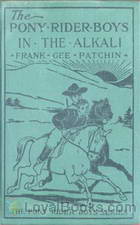 Pony Rider Boys in the Alkali
Pony Rider Boys in the Alkali
Yee-Haww! The Pony Rider Boys are on the move again! This time the boys are in the desert of Nevada, discovering the beauty and perils in 100 degree heat. It should be another thrilling ride that Professor Zepplin has taken them on! | |
 Pony Rider Boys in the Grand Canyon
Pony Rider Boys in the Grand Canyon
Yee-Haaww! The Pony Rider Boys are on the move again. The boys are back home, but as they are chopping wood, it is decided that they need a new adventure out west. Mr. Perkin's, Walter's dad, has suggested the Grand Canyon. So, meeting Professor Zepplin on the way, they set out on the train for Arizona. Previous book in the series: The Pony Rider Boys in New Mexico Next book in the series: The Pony Rider Boys with the Texas Rangers | |
 Pony Rider Boys in the Ozarks
Pony Rider Boys in the Ozarks
Yee-Haw!! The Pony Rider Boys are on the move again! This time the boys are in the Ozark Mountains in Missouri. With Joe Hawk, or Eagle-eye, guiding them, Professor Zepplin and the Pony Rider Boys are sure to find many adventures in this action-packed, fourth book of this series by Frank Gee Patchin. | |
By: Matthew Phipps Shiel (1865-1947) | |
|---|---|
 Purple Cloud
Purple Cloud
The story, a recording of a medium's meditation over the future writing of the text, details the narrator's (Adam Jeffson's) expedition to the North Pole during the 20th century on board the Boreal. Jeffson's fiancée, the Countess Clodagh, poisons her own cousin in order to secure a place on the ship for Jeffson, because the expedition was known to be one of the best ever planned. A millionaire, who died some years previously, had ordered in his will that he would pay 175,000,000 dollars to the first person standing at the North Pole... | |
By: Paul Leicester Ford (1865-1902) | |
|---|---|
 The Great K and A Train Robbery
The Great K and A Train Robbery
In this short novel the narrator is a superintendent on the K. & A. railroad, sometime in the late nineteenth century. The train is robbed somewhere in the Arizona desert. Various adventures involve this young superintendent. Romance is provided by a comely passenger. | |
By: Lady Sarah Wilson (1865-1929) | |
|---|---|
 South African Memories
South African Memories
Lady Sarah Isabella Augusta Wilson was the aunt of Winston Spencer Churchill. In 1899 she became the first woman war correspondent when she was recruited to cover the Siege of Mafeking for the Daily Mail during the Boer War. She moved to Mafeking with her husband at the start of the war, where he was aide-de-camp to Colonel Robert Baden-Powell. Baden-Powell asked her to leave Mafeking for her own safety after the Boers threatened to storm the British garrison. This she duly did, and set off on a... | |
By: Florence Finch Kelly (1859-1932) | |
|---|---|
 Delafield Affair
Delafield Affair
New Mexico's hot, dry winds are taking their toll: cattle suffer long treks to get food and water. But it is not just a hard time for them. Lucy Bancroft has sought a milder climate so she can recover from typhoid fever. She and her father stop to see Curt Conrad, a rancher, on their way to their new home. The two men discuss politics (some of it crooked) at the state level. they also talk about an easterner, a man named Delafield, who years earlier cheated Conrad's father out of his considerable wealth. Curt has vowed to seek revenge on Delafield if he can ever find the crook. thus begins a harrowing tale of determined search and blossoming love in the hot, dry climate of New Mexico. | |
By: Homer Eon Flint (1888-1924) | |
|---|---|
 The Lord of Death and the Queen of Life
The Lord of Death and the Queen of Life
A doctor, an architect, an engineer, and a geologist step into a space car. In their new invention, they set off on an expediton to Mercury, planning to visit Venus on the return voyage. On Mercury they find a strange city eerily abandoned. Sculptures of giant figures alarm them. In a building they discover a machine. The engineer gets it running, and blaring out of the machine a thundering voice speaking Mercurian begins to sound in a way that conveys to them that it is telling a story. After an enormous effort the men translate the audio book... | |
By: Eleanor M. Ingram (1886-1921) | |
|---|---|
 Game and the Candle
Game and the Candle
Faced with inherited debts, an estate to maintain, and no money to pay for either, brothers John and Robert Allard have a difficult decision to make. How much of their integrity are they willing to compromise in order to save their aunt and cousin from a life of poverty and to preserve "all that they call life"? Two young men with a classical education, no trade, and no outstanding talents have little chance to make the fortune they need while staying on the right side of the law. Especially as they only have six months..... ( | |
By: St. George Henry Rathborne (1854-1938) | |
|---|---|
 Boy Scouts First Camp Fire
Boy Scouts First Camp Fire
The Silver Fox Patrol is out on their first camping trip! The boys, Thad the fill-in scout-master, Allan, Bumpus, Davy Jones, Smithy, Bob White, Giraffe and Step-Hen, are learning many new things about being scouts and about themselves. But when a bear invades the camp, their trip turns into an adventure that they will talk about for a long time! Herbert Carter is one of many pseudonyms used by St George Rathborne. | |
 Boy Scouts in the Blue Ridge
Boy Scouts in the Blue Ridge
The Silver Fox Patrol is hiking in the Blue Ridge Mountains of North Carolina, at the invitation of Bob White. They are enjoying their outing in a real wilderness, but trouble comes along from a local Moonshiner. Herbert Carter is one of many pseudonyms used by St George Rathborne. (Ann Boulais) | |
By: Paul Creswick (1866-1947) | |
|---|---|
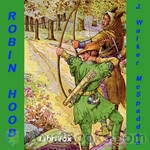 Robin Hood
Robin Hood
"Well, Robin, on what folly do you employ yourself? Do you cut sticks for our fire o' mornings?" Thus spoke Master Hugh Fitzooth, King's Ranger of the Forest at Locksley, as he entered his house.Robin flushed a little. "These are arrows, sir," he announced, holding one up for inspection.Dame Fitzooth smiled upon the boy as she rose to meet her lord. "What fortune do you bring us to-day, father?" asked she, cheerily.Fitzooth's face was a mask of discontent. "I bring myself, dame," answered he, "neither more nor less... | |
By: George Bethune English (1787-1828) | |
|---|---|
 A Narrative of the Expedition to Dongola and Sennaar
A Narrative of the Expedition to Dongola and Sennaar
As a second lieutenant in the United States Marine Corps during the War of 1812 assigned to Marine Corps headquarters, English sailed to the Mediterranean, and was among the first citizens of the United States known to have visited Egypt. Shortly after arriving in Egypt he resigned his commission, converted to Islam and joined Isma'il Pasha in an expedition up the Nile River against Sennar in 1820, winning distinction as an officer of artillery. He published his Narrative of the Expedition to Dongola and Sennaar (London 1822) regarding his exploits. (Introduction adapted by obform from Wikipedia) | |
By: Robert Sidney Bowen (1900-1977) | |
|---|---|
 Dave Dawson on Guadalcanal
Dave Dawson on Guadalcanal
One of a series of youth-oriented adventure books set in contemporary WWII era, featuring fictional American flying ace, Dave Dawson. | |
By: Victor G. Durham (1862?-1925?) | |
|---|---|
 Submarine Boys and the Middies
Submarine Boys and the Middies
The Pollard is about to be taken to Anapolis, where the United States Navy will train their midshipmen how to run the submarine. Jack, Hal and Eph are all to help with training and to see the sights in Anapolis. They might even persuade the Navy to buy the second submarine, the Farnum. (Ann Boulais) | |
 Submarine Boys on Duty
Submarine Boys on Duty
Jack Benson and Hal Hastings arrive in Dunhaven, looking for adventure. But in a sleepy, little town, they might not find much. When they find out that there is a submarine in the shipyard, they decide that this is what they have been looking for. | |
 Submarine Boys' Trial Trip
Submarine Boys' Trial Trip
The torpedo submarine's inventor, Jack Farnum, is looking for investors to help him kick his new shipyard into high gear. He already has his crew set, with sixteen year old Jack Benson as the captain, and his friend Hal Hastings running the engines. But, there may be some changes to the crew of the Pollard on the horizon. | |
 Submarine Boys' Lightning Cruise
Submarine Boys' Lightning Cruise
Captain Jack Benson and Hal Hastings have been sailing in torpedo submarines a while now. But, there is new danger that they will have to get used to, having the actual torpedoes onboard! They will be trying out a new boat, named after Hal, with the Navy watching closely. But trouble is always close by. (Ann Boulais) | |
 Submarine Boys and the Spies
Submarine Boys and the Spies
It is a wonderful December day in Spruce Beach, FL, and everyone is waiting, waiting for something special that has been promised. The "Benson", the fast submarine built by the Pollard Submarine Boat Company, is set to arrive. But, there are more people who are interested in the "Benson" than those picnicking on the beach. Who could they be? (Ann Boulais) | |
By: Charles B. Cory (1857-1921) | |
|---|---|
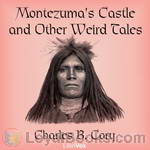 Montezuma's Castle and Other Weird Tales
Montezuma's Castle and Other Weird Tales
This is a collection of weird tales inspired from the natural history expeditions of the author, an independently wealthy bird collector, Olympic golfer, writer of many books on birds of the world, and, as evidenced in these pages, a fine storyteller to boot. | |
By: J. Thorne Smith, Jr. (1892-1934) | |
|---|---|
 Biltmore Oswald
Biltmore Oswald
The hilarious diary of a young man's recruitment into, and service in a navy, which, though well equipped and disciplined, remains woefully ill prepared for his arrival and dubious contribution. (Introduction by Nigel Boydell) | |
By: Howard R. Garis (1873-1962) | |
|---|---|
 Baseball Joe of the Silver Stars
Baseball Joe of the Silver Stars
"Baseball Joe" Matson has recently moved to Riverside with his family, in this opening volume of Baseball Joe series. Joe is a wide-awake country boy who enjoys playing baseball. We follow his career in the series, and his adventures, as he joins Riverside's local nine and makes good, playing the position he most enjoys - that of pitcher, are recounted here. When not on the diamond, Joe is assisting his father against foes who are trying to steal Mr. Matson's machinery patents.Lester Chadwick is one of dozens of house pseudonyms created by the Stratemeyer Syndicate in the early to mid 1900's, to "author" children's series... | |
By: Ellen C. Babbitt (1872-) | |
|---|---|
 More Jataka Tales
More Jataka Tales
The continued success of the "Jataka Tales," as retold and published ten years ago, has led to this second and companion volume. Who that has read or told stories to children has not been lured on by the subtle flattery of their cry for "more"? The Jataka tales, regarded as historic in the Third Century B. C., are the oldest collection of folk-lore extant. They come down to us from that dim far-off time when our forebears told tales around the same hearth fire on the roof of the world. | |
By: Willis George Emerson (1856-1918) | |
|---|---|
 Smoky God or a Voyage to the Inner World
Smoky God or a Voyage to the Inner World
The Smoky God, or A Voyage Journey to the Inner Earth is the narrative of an aged Norwegian sailor compelled before he dies to tell the story of how he found a passageway to the center of the earth and discovered a world peopled with giants. | |
By: Donald Wollheim (1914-1990) | |
|---|---|
 The Secret Of The Ninth Planet
The Secret Of The Ninth Planet
An alien race has put a station on Earth and other planets in order to steal the rays of the sun, possible causing the sun to nova within two years. Burl Denning, a high school student, is the only person who has the power to stop the alien project. Can he and the crew of the experimental space ship Magellan act in time to save the earth? | |
By: Charles E. Carryl (1841-1920) | |
|---|---|
 Davy and the Goblin
Davy and the Goblin
Eight-year-old Davy reads Lewis Carroll's novel Alice's Adventures in Wonderland and begins to get very sleepy. Suddenly a goblin appears in the fire and takes Davy on a "believing voyage" much like Alice's own adventures in Wonderland, where he meets many characters from fantasy and literature. | |
By: Marcel Allain (1885-1969) | |
|---|---|
 The Exploits of Juve
The Exploits of Juve
Fantômas was introduced a few years after Arsène Lupin, another well-known thief. But whereas Lupin draws the line at murder, Fantômas has no such qualms and is shown as a sociopath who enjoys killing in a sadistic fashion.He is totally ruthless, gives no mercy, and is loyal to none, not even his own children. He is a master of disguise, always appearing under an assumed identity, often that of a person whom he has murdered. Fantômas makes use of bizarre and improbable techniques in his crimes, such as plague-infested rats, giant snakes, and rooms that fill with sand... | |
By: Mary Hallock Foote (1847-1938) | |
|---|---|
 In Exile and Other Stories
In Exile and Other Stories
Six short stories by Mary Hallock Foote (1847–1938), an American author and illustrator. She is best known for her illustrated short stories and novels portraying life in the mining communities of the turn-of-the-century American West. She is famous for her stories of place, in which she portrayed the rough, picturesque life she experienced and observed in the old West, especially that in the early mining towns. She wrote several novels, and illustrated stories and novels by other authors for various publishers... | |
By: Dhan Gopal Mukerji (1890-1936) | |
|---|---|
 Kari the Elephant
Kari the Elephant
The adventures of an Indian boy and his beloved elephant. Born near Calcutta, Mukerji won the Newbury Medal for children's fiction. | |
By: Unknown | |
|---|---|
 Fall of the Nibelungs
Fall of the Nibelungs
"The Fall of the Nibelungs" is Margaret Armour's plain prose translation from the middle high German of the "Nibelungenlied", a poetic saga of uncertain authorship written about the year 1200. The story is believed by many to be based on the destruction of the Burgundians, a Germanic tribe, in 436 by mercenary Huns recruited for the task by the Roman general Flavius Aëtius. The introduction to the 1908 edition summarizes the story, "And so 'the discord of two women,' to quote Carlyle, 'is as a little... | |
By: Clayton Edwards | |
|---|---|
 Treasury of Heroes and Heroines
Treasury of Heroes and Heroines
It would be pleasant indeed to gather the characters of this book together and listen to the conversation of wholly different but interested couples—for this is a book of contrasts and has been written as such. Lives of the most dramatic and adventurous quality have been gathered from all corners of the earth, and from every age in history, in such a way that they may cover the widest possible variety of human experience. The publishers believe that such a book would not be complete without some characters that are no less real because they have lived only in the minds of men... | |
By: Reuben Gold Thwaites (1853-1913) | |
|---|---|
 Afloat on the Ohio
Afloat on the Ohio
Afloat on the Ohio, An Historical Pilgrimage, of a Thousand Miles in a Skiff, From Redstone to Cairo.There were four of us pilgrims—my Wife, our Boy of ten and a half years, the Doctor, and I. My object in going—the others went for the outing—was to gather "local color" for work in Western history. The Ohio River was an important factor in the development of the West. I wished to know the great waterway intimately in its various phases,—to see with my own eyes what the borderers saw; in imagination, to redress the pioneer stage, and repeople it. ( From the Preface ) | |
By: Ethel Twycross Foster (1881-1963) | |
|---|---|
 Little Tales of the Desert
Little Tales of the Desert
A six year-old girl named Mary spends Christmas vacation with her parents in the Arizona desert of 1901 or thereabouts. | |
By: David Whitelaw | |
|---|---|
 The Princess Galva
The Princess Galva
Edward Povey had been a correspondence clerk for twenty-two years when he was summarily dismissed. So how did he find himself mixed up with an orphan girl, who was really a princess, as she sought to reclaim her throne from the man who had killed her parents? Well, however it had happened, it was romantic. And after two decades in the basement office of a shipping company, he was ready for a bit of romance. (Introduction by MaryAnn) | |
By: Morgan Scott | |
|---|---|
 Rival Pitchers of Oakdale
Rival Pitchers of Oakdale
Play Ball!!! It's the start of another baseball season at Oakdale Academy. But there is a rivalry brewing between the pitchers. One wants to be a starting pitcher, but he is inconsistent. Another, a new kid from Texas, has been mentored by last year's starter, and is proving to have talent. And don't forget that starting pitcher from last season, he wants to continue to take the rubber for the team. This should prove to be an exciting season for the boys! | |
By: Austin Bishop | |
|---|---|
 Tom of the Raiders
Tom of the Raiders
Young Adult historical fiction of a young man joining the Union Army and taking part in the Great Locomotive Chase. | |
By: Alfred Lawson (1869-1954) | |
|---|---|
 Born Again
Born Again
"I doubt that anyone who reads [Born Again] will ever forget it: it is quite singularly bad, with long undigestible rants against the evils of the world, an impossibly idealistic Utopian prescription for the said evils, and - as you will have gathered - a very silly plot." - oddbooks.co.ukAlfred Lawson was a veritable Renaissance man: a professional baseball player, a luminary in the field of aviation, an outspoken advocate of vegetarianism and economic reform, and the founder of a pseudo-scientific crackpot philosophy called Lawsonomy... | |
By: Joseph Hocking (1860-1937) | |
|---|---|
 Weapons of Mystery
Weapons of Mystery
Justin Blake receives an invitation from his old school-fellow Tom Temple to join him and his family for the Christmas holidays in Yorkshire. Having no other plans, he decides to go. Though he is normally much the opposite of what would be called a lady's man, he falls instantly in love with Miss Forrest, one of the guests, who had already shared his train compartment on the way. When he meets the mysterious Herod Voltaire and finds that he must protect the girl from him and his weapons of mystery, the adventure begins. | |
By: Anonymous | |
|---|---|
 The History of Robinson Crusoe
The History of Robinson Crusoe
A 6-page digest of Defoe’s famous work for young readers. | |
By: Zane Grey (1872-1939) | |
|---|---|
 To The Last Man
To The Last Man
The story follows an ancient feud between two frontier families that is inflamed when one of the families takes up cattle rustling. The ranchers are led by Jean Isbel and, on the other side, Lee Jorth and his band of cattle rustlers. In the grip of a relentless code of loyalty to their own people, they fight the war of the Tonto Basin, desperately, doggedly, to the last man, neither side seeing the futility of it until it is too late. And in this volatile environment, young Jean finds himself hopelessly in love with a girl from whom he is separated by an impassable barrier. | |
By: John Buchan (1875-1940) | |
|---|---|
 Huntingtower
Huntingtower
Dickson McCunn, a respectable, newly retired grocer, plans a walking holiday in the hills of south-west Scotland. He meets a young English poet and finds himself in the thick of a plot involving the kidnapping of a Russian princess, who is held prisoner in the rambling mansion, Huntingtower. This modern fairy-tale is also a gripping adventure story. | |
By: Wilkie Collins (1824-1889) | |
|---|---|
 The Dead Secret
The Dead Secret
"Everything in life has a price. May be, telling a Secret has the highest. However, not telling may be worse. What will Sarah choose? will she tell the Secret which destroyed her life?" | |
By: Aaron Smith (?-1862) | |
|---|---|
 The Atrocities of the Pirates
The Atrocities of the Pirates
In 1822, Aaron Smith, a young English seaman, was taken captive by Cuban pirates when his ship was boarded en route from Jamaica to England. Forced to work as a navigator and as a member of pirate boarding parties, he witnessed unspeakable acts of murder and torture. Befriended by a young Cuban woman, he managed to escape with his life, but was arrested as a pirate in Havana and sent back to England in chains. There, he found himself on trial for his life at the Old Bailey courthouse—with the attorney general himself leading the prosecution. Smith's dramatic account of his personal experience is a brutally honest, unromanticized [sic] look at piracy in the 19th century. | |
By: Zane Grey (1872-1939) | |
|---|---|
 The Heritage Of The Desert
The Heritage Of The Desert
Jack Hare is a young cowboy who was rescued from sure death by an old settler by the name of August Naab. Hare learns that Naab's ranch is a dangerous place and is challenged by cattle thieves and a corrupt rancher who is after Naab's water rights. The greatest danger Hare faces though, is over Mescal, a half-Navajo shepherdess who is already promised in marriage to Naab's first-born son. Hare must stop the marriage, but can't kill the son of his benefactor, August Naab...until a gun battle with rustlers brings the two face-to-face over drawn pistols. | |
By: Owen Wister (1860-1938) | |
|---|---|
 The New Swiss Family Robinson
The New Swiss Family Robinson
A parody of its famous predecessor, this short piece was written by Owen Wister for the Harvard Lampoon | |
By: Maurice Leblanc (1864-1941) | |
|---|---|
 813
813
As usual, gentleman thief Arsene Lupin finds himself wrongfully accused of murder, and must find the real killer to clear his coloured name. | |
By: Ray Cummings (1887-1957) | |
|---|---|
 The World Beyond
The World Beyond
Lee Anthony finds himself and two of his friends kidnapped and taken on a strange voyage. | |
By: Ambrose Bierce (1842-1913) | |
|---|---|
|
At the outset of the American Civil War, [the writer Ambrose] Bierce enlisted in the Union Army's 9th Indiana Infantry Regiment....In February 1862 he was commissioned First Lieutenant, and served on the staff of General William Babcock Hazen as a topographical engineer, making maps of likely battlefields. Bierce fought at the Battle of Shiloh (April 1862), a terrifying experience that became a source for several later short stories and the memoir, "What I Saw of Shiloh". In June 1864, he sustained a serious head wound at the Battle of Kennesaw Mountain, and spent the rest of the summer on furlough, returning to active duty in September. He was discharged from the army in January 1865. | |
By: Charles W. Diffin (1884-1966) | |
|---|---|
 Dark Moon
Dark Moon
Mysterious, dark, out of the unknown deep comes a new satellite to lure three courageous Earthlings on to strange adventures. | |
By: John Lloyd Stephens (1805-1852) | |
|---|---|
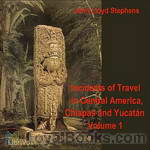 Incidents of Travel in Central America, Chiapas, and Yucatan, Vol. 1
Incidents of Travel in Central America, Chiapas, and Yucatan, Vol. 1
The year is 1838. The scene is the dense Honduran forest along the Copán River. Two men, John Lloyd Stephens and Frederick Catherwood, are about to rediscover Mayan civilization. Their guide, slashing through the rampant growth with his machete, leads them to a structure with steps up the side, shaped like a pyramid. Next they see a stone column, fourteen feet high, sculptured on the front with a portrait of a man, “solemn, stern and well fitted to excite terror,” covered on the sides with hieroglyphics, and with workmanship “equal to the finest monuments of the Egyptians... | |
By: James Oliver Curwood | |
|---|---|
 Kazan
Kazan
Kazan (sometimes published with the subtitle The Wolf Dog) is a once very popular novel by environmentalist and author James Oliver Curwood. After a trip to the Yukon area of Canada and Alaska, Curwood wrote a series of wilderness adventure novels that were best-sellers in the 1910’s and 1920’s and remained popular through mid century. Jack London had begun the vogue for northland dog stories with his Call of the Wild and White Fang, and there were many imitators, but none had a greater impact than Curwood... | |
By: Pierre Loti (1850-1923) | |
|---|---|
 War
War
Pierre Loti [Julien Viaud] (1850-1923) was a French naval officer and novelist. The present book is one of his few works of non-fiction, a small collection of letters and diary entries that describe his views and experiences in the wars and military operations in which he participated. Besides World War I, he also sheds light upon his views and involvement in the preparations for the Turkish Revolution of 1923, for which until today a famous hill and popular café in Istanbul are named after him. | |
By: Benjamin Harris (1781-1858) | |
|---|---|
 The Recollections of Rifleman Harris
The Recollections of Rifleman Harris
The recollections of a British infantryman who served in the British army during the Napoleonic Wars. | |
By: Richard Harding Davis (1864-1916) | |
|---|---|
 The Lost House
The Lost House
Austin Ford, the London correspondent of the New York Republic, is spending some idle time in the American Embassy chatting with the Second Secretary, when suddenly a note is brought in. This note is an appeal for help, found in the gutter in a dark alley. The writer claims to be a young girl, who is kept against her will locked up in a lunatic asylum by her uncle. Although the Second Secretary tries to convince him that there is nothing to it, the journalist is determined to follow the lead... | |
By: Bret Harte (1836-1902) | |
|---|---|
 The Luck Of Roaring Camp And Other Sketches
The Luck Of Roaring Camp And Other Sketches
Bret Harte (1836–1902) was an American author and poet, best remembered for his accounts of pioneering life in California.... He moved to California in 1853, later working there in a number of capacities, including miner, teacher, messenger, and journalist. He spent part of his life in the northern California coastal town of Union (now known as Arcata), a settlement on Humboldt Bay that was established as a provisioning center for mining camps in the interior.... In 1868 he became editor of The Overland Monthly, another new literary magazine, but this one more in tune with the pioneering spirit of excitement in California... | |
By: Jack London (1876-1916) | |
|---|---|
 The Game
The Game
Jack London wrote at least four stories about boxing; A Piece of Steak (1909), The Mexican (1911), The Abysmal Brute (1911), and The Game (1905). The Game is told, in part, from the point of view of a woman, the fiancée of one of the competitors. This is to be his last fight and they are to be married on the morrow. Against her better judgment, she agrees to watch the bout. (Introduction by Tom Crawford) | |
By: Richard Harding Davis (1864-1916) | |
|---|---|
 The Make-Believe Man
The Make-Believe Man
Adventure was what our protagonist was looking for, when he boarded the steamer "Patience" for his holiday, and when one has a man with such a vivid imagination like Joseph Forbes Kinney as a travel companion, who seems to find adventures at every turn of the road (and if not, he manufactures them), the two travellers are sure to stumble into trouble... | |
By: Owen Wister (1860-1938) | |
|---|---|
 Members of the Family
Members of the Family
Members of the Family is a collection of eight short stories about people in the Wyoming Territory in the late 19th and early 20th centuries. | |
By: Lord Thomas Cochrane (1775-1860) | |
|---|---|
 Autobiography of a Seaman, Vol. 1
Autobiography of a Seaman, Vol. 1
This two volume work is the autobiography of Lord Cochrane, a naval captain of the Napoleonic period. His adventures are seminal to the development of naval fiction as a genre. Marryat sailed with Cochrane, while later writers borrowed incidents from this biography for their fictions. Most notable among these is Patrick O'Brian, three of whose novels have clear parallels to incidents in the life of Cochrane. This first volume covers Cochrane's earlier life, during which he is most active militarily. (Introduction by Timothy Ferguson) | |
By: Miriam Michelson (1870-1942) | |
|---|---|
 A Yellow Journalist
A Yellow Journalist
Rhoda Massey is a young, sharp reporter for a daily newspaper in San Francisco. After proving herself an astute and fearless investigator on her first big story, she spends most of her waking hours running down leads and doing (almost) anything it takes to produce headline grabbing tales and to be the first one to do so. She must compete with her male colleagues where she works but also with those from other newspapers. Rhoda discovers it useful to be pretty and small in stature (great for eavesdropping from tight and unusual locations) but it's her shrewd mind and her nose for news that propel her to pursue stories in dangerous places and, sometimes, from dangerous characters... | |
By: James B. Hendryx (1880-1963) | |
|---|---|
 Snowdrift
Snowdrift
The story revolves around Carter Brent, an alcoholic and gambler who had struck gold many times in the Yukon, but gambled and drank it away in Dawson; and Snowdrift, the half-breed who had spent her life with a wandering band of Indians in the frozen north country. Snowdrift had been raised by Wananebish, yet never knew who her father was, and yet Wananebish had somehow been able to send her to be schooled at a nearby mission.The paths of this unlikely pair would cross in the barren lands of the Yukon where Brent had hopes of finding more gold, but it was well known that there was no gold in the region between Dawson and the MacKenzie... | |
By: Stella M. Francis | |
|---|---|
 Camp-Fire Girls in the Country or The Secret Aunt Hannah Forgot
Camp-Fire Girls in the Country or The Secret Aunt Hannah Forgot
Teen-ager Hazel Edwards and the other twelve members of the Flamingo Camp-Fire Girls experience some real adventure when they are invited to spend part of their summer as guests of Hazel’s elderly aunt on her large country farm. Mrs. Hannah Hutchins is a widow living alone with a few servants and farming assistants in her home in the midwestern town of Fairberry. The girls set up camp on a section of Aunt Hannah’s farm but, before too long, an incident occurs during the annual Fourth of July celebration in Fairberry... | |
By: A. A. Milne (1882-1956) | |
|---|---|
 Once a Week
Once a Week
A collection of short stories by famed Winnie the Pooh author, A.A. Milne. This charmingly humorous work from Milne's earlier writing period was first published in Punch magazine. | |
By: John Relly Beard (1800-1876) | |
|---|---|
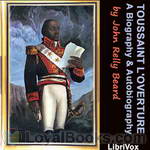 Toussaint L’Ouverture: A Biography and Autobiography
Toussaint L’Ouverture: A Biography and Autobiography
François-Dominique Toussaint L’Ouverture (1743-1803) rose to fame in 1791 during the Haitian struggle for independence. In this revolt, he led thousands of slaves on the island of Hispañola to fight against the colonial European powers of France, Spain and England. The former slaves ultimately established the independent state of Haiti and expelled the Europeans. L’Ouverture eventually became the governor and Commander-In-Chief of Haiti before recognizing and submitting to French rule in 1801... | |
By: Francis Godwin (1562-1633) | |
|---|---|
 The Man in the Moone
The Man in the Moone
A self-serving Spaniard discovers a means of traveling to the moon, describing his sensations in transit in terms remarkably consistent with modern astronauts' experiences. He finds on the moon a utopia, which he describes in detail, but being a fallen creature, he takes the first opportunity of coming home. ( | |
By: Henry Rider Haggard (1856-1925) | |
|---|---|
 Pearl Maiden
Pearl Maiden
This is the story of Miriam, an orphan Christian woman living in Rome in the first century. She falls in love with a Roman officer, but knows that her Jewish childhood playmate loves her too and will do anything in order to get her love in return. | |
By: Barbara Hofland (1770-1844) | |
|---|---|
 The Young Crusoe, or The Shipwrecked Boy
The Young Crusoe, or The Shipwrecked Boy
The Young Crusoe, or The Shipwrecked Boy (1829) Novel. At the novel's opening, Charles Crusoe, thirteen years of age, asks his mother if he is related to the famous Robinson Crusoe, and is told that he is not. His future adventures, however, strongly resemble those of the earlier Crusoe. | |